|

Home-made ice cream.
(*photo credit)
October 1, 2010 Food
Attitudes: A Personal Journey
There are many agencies and
much literature dealing with food issues. The reason I am focusing on this
issue right now is that food is too often taken for granted and yet is a major
component of our total environment. We need to focus if we are to heal a
wounded and hunger-filled planet, for we take food bounty for granted. We waste
food; we don't eat the right food and we eat too much of the wrong types; we
lack moderation in food intake; we fail to share food with others, and we are
insensitive to the food needs of the hungry. Furthermore, we need to uncover
the hidden influences at work in our life's journey -- and that involves food.
A
personal discernment considers influences dealing with food availability, cost,
safety, as well as personal preferences, peer and community pressure,
advertising and promotion by commercial interests, convenience in preparation,
and care-giver dictates. At certain times foods are deemed unsafe due to
environmental contamination. Even patriotic or religious considerations color
our attitudes about food. The following are some reasons that make this focus
needing attention today:
*
Environmental considerations -- Since many foods are bought either
out-of-season or originate in distant lands, the cost of shipping these
substances can add much to an already overloaded planetary carbon footprint.
Some foods are contaminated by pesticides and other chemicals;
* Personal health --
I am in a borderline area with an elevated cholesterol level and difficulty in
maintaining my weight at a moderate limit (waist and hip girth being equal);
*
Personal mission and achievements -- This discernment can help others
with the same issues; growing one's own food and preparing one's meals are ways
of enhancing a person's sense of wellbeing and outlook on life;
*
Community nutrition and health -- We live among people who do not
have adequate food or have unbalanced diets through not choosing nutritious
foods in reasonable quantities. The Appalachian region has one of the highest
obesity rates in America;
*
Community economics -- Bargains are there for the taking by people who
want high quality but lower-priced foods;
*
National food safety and energy policy -- The governmental system for
safeguarding our food supplies is not working perfectly. Today, a sizeable
portion of America's best food producing lands is being diverted to production
of ethanol to help fuel our wasteful vehicles; and
* Global crisis --
Food is in short supply worldwide and will get scarcer in the upcoming decades
with the impending climate change conditions now unfolding.

Monarch enjoying October goldenrod.
(*photo credit)
October 2, 2010 Method
Used for Food Reflections
In my recent work,
Tobacco Days, A personal Journey, I found that attitudinal changes occur
during an entire lifetime, and it is wise for elders to recall them while the
memory is sound and we can still reconstruct our life's journey with some degree
of accuracy. A record similar to that for tobacco is possible for our attitudes
about foods. Infants play with their food and old folks push it aside. Both
practices along with many in middle life are wasteful and require attitudinal
changes. During each period of life, our approach to food changes in time and
these changes ought to bring us to wiser food choices. Here I describe eight
stages of attitudinal changes, one for each decade of life. In the tobacco
journey, the focal material was addictive. With food there are similarities.
The food industry (sometimes overlapping the tobacco industry) seeks to persuade
consumers to spend more and more on processed materials that are not always
healthy. Food is needed for our survival, but it can be simply prepared and
nutritious.
Food
is mentioned in the Scriptures hundreds of times; some have given the actual
count as over six hundred. A Scriptural quote at the start of each section does
not do justice to the attitudes that prevailed in the Middle Eastern culture of
biblical times. Food was important, made inviting and used as a setting for
important events. This is a theme in itself and worth remembering, because some
of our current attitudes have a long cultural history that has religious as well
as ethnic roots. Note also that our listing of food issues is not exhaustive;
we could treat threatening or contaminated food, needs of people with food
allergies, or the eating of dog or cat meat that is rejected within European
culture. At times, people are forced to eat foods that make them ill at the
time or later.
The goal of this
series of essays is to discern my own food journey and to invite readers to do
the same. It is a journey to better food use, purchase, storage, choice, and
disposal. With this growth of consciousness we may work as a community to
understand the economic, political, and social ramifications of food. In so
doing our sensitivity to use and misuse of food becomes more evident. Through
using lead questions and tentative answers, we invite others to use these and
other questions for discussion.
Our
methodology is to combine a series of Daily Reflections in an orderly
fashion. The October and November, 2010 Daily Reflections contain eight full
weeks, one each per decade, along with introductions and conclusions. October
is harvest season and November has Thanksgiving Day. Each of eight decades
yields a change in attitudes: food reflects changing tastes; we must work for
our food; food is a total experience; food is sacred and can be consecrated;
food has a political aspect; food must be grown to be appreciated; food must be
geared for our needs; and food is a gift for which we should show gratitude.

View of blue sky through warm eyes of a canine friend.
(*photo credit)
October 3, 2010
Homily: Increase Our Faith
The apostles asked Jesus to
increase their faith, and he replied that if their faith was the size of a
mustard seed, and they were to say to the sycamore "be uprooted and
transplanted into the sea," it would obey them (Luke 17:5). This is
reminiscent of the parable of the mustard seed, being a small seed that grows
into the "largest of shrubs." One year, one of my mustard plants in the ASPI
solar greenhouse burst forth and grew to the ceiling; it made me realize that
mustard could get tall. The size of the seed or plant is a reminder that from
small beginnings can come great things. This gives us courage in our journey of
faith.
God gives us faith, and so
we must always be thankful for that gift. We are placed here on Earth at this
time like a plant in a flowerpot. We can decide to stay put and look out only
for ourselves (so we then become root-bound and that chokes off further
growth). Or we can learn to share ourselves with others and thus allow the
plant to multiply and increase. Jesus even speaks of that transfer as being
quite dramatic -- of the mulberry tree uprooted and planted in the sea. By
going out to others we grow in faith, for our trust is soon replicated and a
miracle of new life appears among all involved.
We must trust the power of
faith. I confess I found the passage about the humble servant who comes in from
the field and then after a day's work continues by waiting on the master
somewhat difficult. But on study, it does appear to be about my duties as a
faithful person. Jesus likens our duty in being responsive and receptive to
that servant who says, "We have done what we were obliged to do." The humble
response tells us how we are to see our instrumentality in the increase of
faith. God gives us enough faith to do our duty; God makes us the weak
instruments that we are but gives us the chance to help transform that weakness
by working through the power of the resurrection. It is our weakness that we
acknowledge by waiting on table; God gives us the opportunity to show through
our actions the marvelous power of divine work in the world.
Our
trust comes through humble work. We have to do our part with enthusiasm , i.e.,
the God within. That means we do so with heart and hands and head and thus
manifest the Trinity within. To wait on table to supply another's food needs
requires heart, hands and head. We respond to God's call by trusting our loving
God to work faith miracles through our instrumentality. We open ourselves to
express our faith to others. We are being transformed and replicated in what we
encourage others to do. Too often we only become aware of our limitations and
disheartened by the massive work ahead. How can I bring my loved ones back to
faith? Will others pray?
Prayer
of the week: Lord, stand behind our efforts in assisting others in their
journey of faith, even if the results will occur after our passing away.
Introduction to 1930s:
Food as Uncritical Sustenance
You
must not molest or oppress the stranger, for you were once foreigners yourselves
in the land of Egypt. (Exodus 22:20)
The
first half of my life involved formal education and scientific research, and
clearly comprised periods when food was often taken for granted. This half of
life included infancy, the basic schooling, college, seminary, higher education
and research and post-doctorate work. Amazingly, there were many variations in
foods during that portion of life; attitudinal change was occurring but was of a
subtle nature. That was especially true during the earliest years. Much as
with my experience with tobacco, the period was one of duty, patriotism,
unquestionable acceptance of the status quo, and failure to recognize changes
that were actually occurring in my life. Food issues were surfacing.
During
the Great Depression our family was thankful for having enough to eat even
though we were too poor for an electric hookup. Farmers were losing farms left
and right, and those who were fortunate enough to retain their farms had to
scrape hard to feed families: raising gardens, corn, hogs, chickens and milk
cows. Recently one old lady reminded me that during the Depression her mother
always had the kids take the leftover food from the dinner table to the next
door neighbors who never had enough to eat.
The second World War
followed on the heels of the Depression, though America did not enter that
conflict until 1941. That period witnessed the "Victory Garden" mentality.
Raising one's food was a patriotic act. Several foods (meat and sugar) along
with tires, gasoline and shoes were rationed for the war effort. Growing our
food was regarded as both an economic necessity and an indicator that we were
contributing to the war effort. Many housewives gathered at the local high
school for canning during summer months. Throughout the twentieth century,
American food was relatively low-priced, essentially safe to consume, available
to all people as earned, grown, or through food stamps, and accepted as a given
by the population on the whole. Questioning food issues would come later. No
one ever talked much about governmental regulations or the profitability of food
companies.
Imperceptibly, we
were all changing food habits, and when I recently looked back to a year when I
recorded all the food that I ate that year and compared that with my current
diet, I found massive change. We do not note change as it occurs. In fact, I
hardly know what I ate last week or yesterday. However, with time and later
making my own food purchases, the cost and type of food became more a part of my
awareness. Fast foods would become far more popular; emphasis would shift to
prepared dinners and the frozen food sections of supermarkets; snacks would
become more varied and costly -- and hamburgers, fries and onion rings would be
the rage.

Green amongst falling leaves. Christmas fern, Polystichum acrostichoides.
(*photo credit)
October 4, 2010 Why
Learn to Eat Simple Foods?
On
the feast of St. Francis, simplicity is the theme of the day. Perhaps it is a
perfect time to talk about food games for youth and also adults. The simplest
perhaps is to set up for people two scenarios. In one we see an eager African
family seated around a steaming cornmeal-based main food dish. Each is wanting
to dip in as quickly as possible because hunger drives their eagerness. The
meal is simple and filling -- and is enjoyed by all. A second scenario is a
table at a smorgasbord containing all sorts of delights. A family is departing
after leaving much unfinished food they brought to their table. All leftovers
are to be tossed, for the foods have been dipped out. The eaters leave with
little comment or sign of enjoyment. Where is the joy of eating?
A second game is one I
played somewhere in my long history -- where or when I do not recall. It was a
Christian exercise for we had about fifty people, and five got steak dinners
with trimmings and forty-five of us unfortunate ones got rice, some with lentil
toppings and some without. We were the world's poor. I always hated playing
rigid games and so I organized some of us have-nots and we went over and raided
the haves and took and redivided the plates so all got a little steak and
trimming and the five got a spoonful of rice as a booby prize. We all laughed
but on reflection we realized that this was the Christian thing to do, not
simply to know that hungry and forgotten people are out there.
A
third game is called "potluck." Have a variety of dishes and find out which
ones get eaten up first. In actuality the simpler foods generally are the last
to go and the more exotic ones the first -- but not always, because some people
are finicky eaters. However, finicky eaters may avoid wholesome fruit and raw
vegetables and go for prepared pastas and meats. Finicky often indicates a
rather affluent background, and few who are poor know what this even means, for
most foods taste good to the hungry. Have we always thought of food as God's
gift?
Why
concentrate on food-related games? Really it is because games are the way many
of us interrelated with food in the weaning stage and beyond. However, the
games continued down through the years in differing ways and degrees of
complexity. For some, exotic foods are now almost daily fare, if they have the
funds to pay for them. Teasing someone to eat is a game; getting them to eat
wholesome food is still another and more difficult task. Bribing them with
exotic foods is not good for the planet, the eater, or the feeder. Those who
expect exotic food for daily sustenance are selfish. It reminds us of the
runners who brought the pagan Romans snow or ice from the distant mountains.
Answer:
Eating simply means eating nutritiously, and avoiding refined sugars and fats
that cause obesity and its ill-effects -- high blood pressure or high (unhealthy
types of) cholesterol. Eating wholesome food is more than a game; it is life
or death.
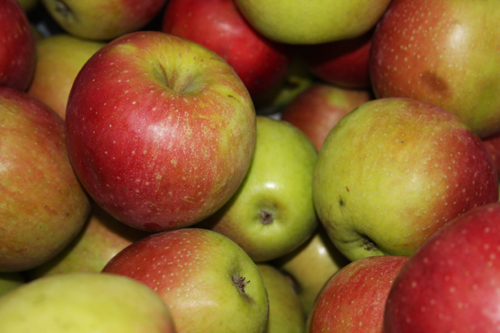
Freshly-picked crop of winesap apples.
(*photo credit)
October 5, 2010
Will You Finish What's on Your Plate?
I came from a family known
for cooking on both Mama's and Daddy's sides. The maternal Schumacher portion
of the family still run a major restaurant at Schonau, Germany, near the French
border. They serve meats, vegetable dishes and desserts similar to our foods on
the other side of the ocean, but a major difference is that mushrooms are
prominent there but not here. French cooking and meat preparation came from
both sides of the family because three-quarters of my ancestry was from that
noble land. Alsatian cooking is famous in France with a heavy emphasis on pork
and sauerkraut and also notable desserts and wines as well.
As a tot, I vividly remember visiting "over home," my mother's home place about
two miles from our farm. I recall my uncles (Mama's brothers) coming out of the
field for "dinner," the mid-day meal. They needed replenishment of energy for
the hard work ahead and ate a plateful of vast hunks of roasted beef smothered
in heavy brown gravy along with ample side orders of large boiled potatoes and
whole carrots. My serving came to me with the horror that I would have to
finish this mountain of food. Aunt Ruth wondered aloud why I didn't eat my
slightly smaller but over-whelming serving. We were to never, ever waste food
-- and never was there a food dilemma like what I faced then on vacation: I
could not eat more and I could not waste what was on the plate.
Years
later, an astute volunteer said that eating what we do not need is "wasting" --
or perhaps "waisting." To sustain someone requires a certain amount of food; to
eat what a growing appetite demands borders on a "waste of" a precious
commodity. We read in delight or horror how the Roman orgies included time out
to regurgitate stomachs-full of gorged food. Oh my! Unfortunately, with time
our stomachs can expand to take in more and more, often beyond what is demanded
for keeping healthy.
July
threshing was when neighbors got together and enjoyed the day of working and
talking. They would assist in threshing a field of wheat. The thresher arrived
the evening before and the local farmers brought teams and wagons and all
enjoyed the day thoroughly. The heart of the day was a major meal prepared by
Mama and others who came to help. There were mountains of fried chicken (in
lard) and home-cured ham, mashed new potatoes, gravy, fresh cucumbers with sour
cream, sliced tomatoes with onions, green beans cooked with ham, corn pudding,
stewed summer apples, rolls, butter and cherry, plum, or blackberry cobbler for
dessert. Needless to say, the threshers all had appetites -- whites at the main
table and the black folks at the porch table, all enjoying exactly the same
food. After that we plunged into the hot work and sun with the added pain of a
full stomach of food.
An
answer: Even to this day, an unfinished plate is the sign in most places of
satisfaction in having enough. For me, left over uneaten food is a sign of
waste even if leaving some is culturally correct in parts of America.
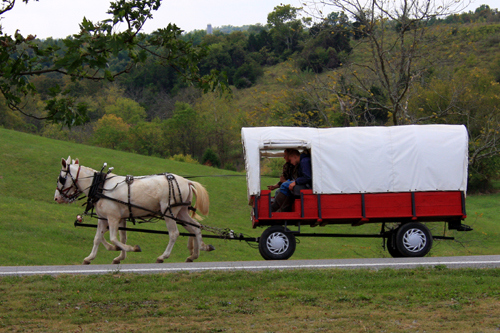
Reflections upon a simpler time.
(*photo credit)
October 6, 2010
Do We Take Food for Granted?
This
basic question is often answered by another often heard question, "How do you
like your steak?" When the answer is "left on the cow," the host seems
offended, for it is assumed you eat steak on major outings; the required choices
are "rare, medium or burnt;" anything beyond the standard reply is truly rare.
In fact, it is not just affluent adults who have a food-for-granted attitude;
sometimes American food stamp users exhibit similar attitudes. Maybe taking
food for granted comes early in life and stays with us. Does it start when we
hit the high chair tray with a spoon with the signal, "Bring on the grub!"? Our
hunger must be sated right now.
Give
us this day our daily bread. We learned the food-related phrase in the
Lord's Prayer by rote early. How often in reciting this prayer did we really
reflect on what was said? Did we ever know what it would be like not to have
access to tomorrow's food today -- and to be radically dependent upon the Lord?
Yes, we tried to be good Christians and say our grace before meals, but what if
daily bread was not accessible by ordinary means? To give a meaningful prayer
before eating indicates that we do not take food for granted, and that this
bountiful gift is from God, the source of all life-giving processes including
food distribution.
Few of us go through a
lifetime without having some experience when food was not readily available -- a
blackout, a car breakdown, being lost on a hiking trip or such. Suddenly food
was not right at hand and we faced a hunger situation by not being near a
refrigerator, a grocery store or even a garden. While hardly noticing it, we
have become accustomed to sufficient food in a generous supply for all to have
their fill. Now we reflect more deeply: what happened on that single
occurrence of hunger is almost a daily occurrence for one billion people
suffering from chronic food shortages. Something is awry in this world and we
feel some responsibility. We must have compassion for our hungry brothers and
sisters -- at least in spirit. However, "in spirit" means doing something about
their condition.
In
my early years, I did not realize that all people, even in our county and state,
do not share that "for granted" comfortable feeling regarding food. This
strikes me today when I watch people in the local budget grocery store carefully
weigh whether they should take this or that item. Many years ago I noted the
fellow in front of me with some potatoes, but unable to pay for his onion with
his simple purchase. I motioned the checker that I would foot the bill. Big
deal! Food stamps make this a rare occurrence today, but conscientious folks
still watch purchases closely.
An
answer: Many Americans take our food supply for granted or as carved in
granite. For quite independent folks who do not want to be on food stamps, this
can be another matter. They can and do go hungry at times, as do the tens of
millions who reside in food-stampless nations.
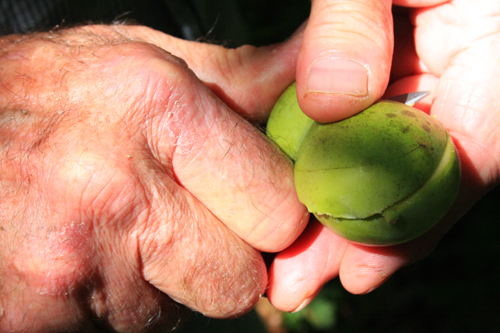
Cutting into ripened wild pawpaw fruit (Asimina triloba).
(*photo credit)
October 7, 2010
Can't You at Least Eat?
My
family has loved to eat because good food beckons. When we were young we needed
our energy sources, and meals were pivotal to our coming together at times
during the day to be replenished. We were a family of heavy breakfasts, heavy
dinners (at mid-day), and heavy suppers as the sun was going down. We had
nutritious food in plentiful supply but fancier foods on special occasions. We
produced our own food: meat (mainly pork and chicken and later beef); eggs,
dairy products (milk, cream, butter, buttermilk, cottage cheese and even some
yellow cheese); vegetables and herbs (tomatoes of various types, cucumbers,
green corn, lettuce, radishes, onions, kale, mustard, endive, green peppers,
horseradish, parsley, peas, beans and new potatoes); and on occasions peanuts,
celery, cantaloupes and watermelons. We gathered blackberries, walnuts and
hickory nuts and had apples, pears, peaches, plums, cherries and grapes for pies
and cobblers.
Breakfasts
were focused on meat (sausage, fried ham or bacon) and eggs, fried potatoes
spiced with onions, cereal, and cottage cheese. However this like all meals had
some variation. At times we had the regional "hoecakes" or what we called corn
cakes; other times there were biscuits and sausage gravy or pancakes made with
wheat flour. Work was the criterion for such a heavy sending off for the day,
for the breakfast was always meant to be the starting point of a working day.
Dinners
were open to all, because there was plenty to go around. It seems that some
visitors timed their unexpected calls just at a major meal time or high noon. I
recall that once a year a St. Anthony Messenger salesman did precisely
that. Annually, he came unannounced but at the precise stroke of noon -- and
said he happened to be passing by. I always suspected he had several hundred
such eating places on his three-state itinerary. Whoever visited or worked on
the farm was invited to partake of the supply of food that we had processed,
including a cellar full of preserves of all types, something of which my mother
was truly proud. Considering the heat of the kitchen in which these were made,
one wonders how she endured, especially since many houses in the South had
external kitchens due to the heat generated in summer cooking.
Suppers
that followed a hard day's work were also substantial. We ate much and we ate
seasonal variety. We had wilted lettuce, radishes, scallions, and dandelions as
spring delicacies; fried apples, cucumbers in sour cream and green beans as
summer fare; endive and mustard or kale greens in autumn, and things from the
canning section in winter such as blackberries, plum preserves and mock
mincemeat pie -- along with fresh sausage in patties or boiled smoked sausage
casings, the containers made from cleaned hog guts.
An
answer: Eating was living, and to eat with others was the most sociable act
that could be performed. Food was a requirement for doing daily farm chores.
When not on such work schedules, regular and volume eating tended to become
somewhat unhealthy.
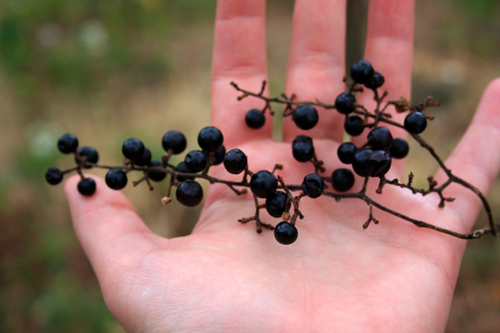
Wild grapes in hand, a tasty treat.
(*photo credit)
October 8, 2010
Do Wild Foods Taste Better?
Early
in life I discovered that things you scavenge in the field or forest always
taste different. That habit never left me. When I was in Israel, the guide
came up and said, "I saw you tasting plants in Judea, but here in the Negeb
remember that every green thing is poisonous." In early spring grasses and
leaves had those distinct tastes that made each interesting. Over the years, I
have graduated to more herbal greens (dandelions, plantain, chickweed, lambs
quarters, wild garlic, etc.). The taste of the wild remains in many ways for
when I enter a new territory I like to taste its produce. However, I preferred
wild flora to gamey wild fauna.
To
harvest wildlife would demand hunting and this sport never appealed to me. The
rare exception was our war on crows that pillaged our corn fields; these
villains would fly onto corn stalks and rip open ear after ear of fresh milky
corn and then move to another, leaving a path of destruction. However, wild
young fried crow did prove tasty when once tried. In my youth we did not
experience the current hordes of wild turkeys, geese and deer now frequenting
our rural areas and feasting where they wish. We would have extended hunting to
them as well, and have avoided innocent rabbit, dove and squirrel in which I
found absolutely no sporting fun at all. I am not patient enough to fish or
clean catfish.
Wild
plants did not require the tender, loving care afforded to garden or orchard
cultivars; they endure harsh weather conditions fairly well. Early on we
learned never to eat any white berries and that proved to be a good rule of
thumb. We stayed away from "leaves of three" for fear of poisoning, and we
carried a big stick during berry-picking to battle copperhead snakes. We
avoided mushrooms except the recognized morels, even though this county has an
annual "Mushroom Festival." Smooth pink lemonade made from sumac clusters is
great as is the taste of sassafras root and lemon grass. I gather poke twice a
year: in spring and into July the young shoots and leaves can be boiled twice
and the boiling water discarded; the tender shoots can be fixed like asparagus
and the leaves like spinach (poke takes no cultivation and returns each year as
long as the highly poisonous root is undisturbed); in autumn, I harvest poke
berries and put them in the deep freeze and swallow one frozen berry each day to
prevent arthritis/rheumatism.
My
current wild gatherings also include persimmons, papaws, wild plums (my utter
favorite), wild cherries, wild grapes, mulberries of various sorts, walnuts,
hickory nuts, hazelnuts, blackberries, raspberries, elderberries, strawberries,
dew berries, blueberries, and "wine berries." The last named is an exotic
supposedly introduced to America by Thomas Jefferson. The Natural Bridge State
Park folks in my parish bounds regard wine berries as invasive and have wiped
out my favorite berry patch.
An
answer: Yes, wild things taste different and even better. But like all
things, treat the "wild" with care and respect.

White snakeroot, Ageratina altissima.
(*photo credit)
October 9, 2010
Should We Talk about Hog-Killing?
My
earliest recollections of killing hogs was that this was a major undertaking in
cold winter weather, generally in the coldest portion of November before the
holidays, and yet with enough working days before Sundays in order to render
lard and start the curing of hams. I am ambivalent in talking about this food
practice; however it was a major part of early food preparation and a place
where Old World food habits mingled with Appalachian and rural pioneer Kentucky
ones. As a family we never made sorghum (rather chopping all cane for silage);
we pressed cider but did not preserve apples over sulfur as many folks did.
However, like other neighbors we regarded hog-killing as a major food
enterprise.
The
operation often occurred on school days; it was adult work: setting up the
scalding pan, penning in the hogs, shooting them with one shot of a rifle,
sticking or bleeding the hog, scraping off hair in scalding water, stringing up
the hog and gutting it, butchering into ham, shoulders, ribs, head, feet and
sausage parts (pork chops areas), cutting out the fat, rendering the lard, and
making the sausage. The sausage involved Mama's most hated rural task, namely
cleaning the intestines for "casings" that held much of the sausage, salting
with some saltpeter added, and smoking the meat on a hickory wood fire. The
entire operation was ritualized and even continues. Each winter, I assemble
with siblings at Charlie's place to repeat the sausage-making practice.
As
youngsters we did not take part in many hog-killings because they occurred on
schooldays -- except for the earliest part in the morning before the bus ran (my
brothers were crack shots and no one wanted the hog to "squeal" or not be killed
in one shot). We did participate in later afternoon portions of the work. Carl
Moore, my chemist friend and mentor at Loyola University in Chicago, was also
from a Kentucky farm and his memoirs on hog-killing mention that it took place
on Saturdays and that the kids were not allowed to watch the actual killing. We
never killed on Saturday because the second day (thus a Sunday with no servile
work allowed) is a major portion of the entire operation. The work of
scalding, scraping, hoisting the hog and basic butchering was very hard and
required adult strength.
Food
practices certainly have changed during my lifetime. My siblings and cousins
allow professional butchers to do the dirty work of killing and basic
butchering. We simply get together and make the sausage with proper spices
(fresh garlic and ground sage) along with salt and red and black pepper. I have
omitted writing about or picturing hog-killing for books or calendars, nor is it
elaborated upon in "The Latch is Out." Why now? Because this was an attitude
about food with which I have changed. I have not hunted for meat. but I do not
discourage those who are threatened by overabundance of deer, wild turkey,
rabbits, or geese (dress and eat game), or who need meat for sustenance.
An
answer: Cultural food practices are hard to abandon.

Lacy white butterfly.
(*photo by Sally Ramsdell)
October 10, 2010 Homily:
Showing Appreciation for Miracles
There are two ways of
living your life
One is as though nothing
is a miracle,
The other is as though
everything is a miracle
(Albert Einstein)
The story of the healing of
ten lepers with only one returning to give thanks (Luke 17:11-19) can be taken
in a number of ways.
Showing pity or compassion is the
beginning of the miracle. If someone suffers in any way and we recognize that
suffering, we have entered more deeply into the miracle of life and come to
appreciate wellness all the more. Extending pity to another is an opening to
their world, a sharing of what they have to offer to us through a
communication. We discover a privilege in joining them; in offering themselves
they can appreciate our presence right now.
Sharing and appreciating
little gifts is the stepping stone to an atmosphere of gratitude, a ministry
open to everyone. In the story of the ten lepers (Luke 17), at least one person
knows where the gift of healing comes from, and this foreigner takes time to
return and show a sense of gratitude for what was done. For him, the duty is
first to the giver of good gifts and then to the ritual cleansing that would
make someone free to travel within the community. Praise God that at least one
returned! We ought not to regard Jesus as stern and demanding, thus expecting
the dutiful return of each of the healed. Giving thanks is our greatest act of
freedom, and for this we were created human beings with free will. To say an
unsolicited thanks is to praise God in human ways.
Another way of interpreting
the reading is one of enthusiastic participation in the glory of creation and
re-creation. In this view there is light-heartedness, much as at the Easter
episodes. Joy gives rise to being less severe and thus the demanded gratitude
of the severe mind is not present. "I thought there were ten and only one
returned -- and the foreigner." In one part of the disappointment was the point
that faithful believers ought to be the very first to freely give thanks for
gifts received.
A little faith goes a long
way if we believe it does. This explains a previous reading from Luke where the
faith only has to be the size of a mustard seed to work miracles. Here,
recognition of big things as well as small in an appreciative manner is part of
faith and part of the miracle. The response to the gift of Faith is part of the
total faith experience -- "Your faith has saved you." We often think the gift
is so great that our participation is unimportant, but that is not the case.
God invites us to be participants -- and our free response that seems so trivial
is really the grand moment of all creation.
Prayer of the week:
Lord, help us to appreciate all your gifts, especially the miracle of life
itself and the part that food plays in life. Thanks for giving us love to share
with others.
Introduction to
1940s:
Food as Livelihood
We gave you a rule when we were with you; not to let anyone have any food if he
refused to do any work. (II Thessalonians 3:10)
During difficult periods,
many people seek every possible way to supplement an income. While we regarded
ours as a "tobacco farm," it actually produced a variety of crops along with
grasslands: corn, hay, wheat, fruit and vegetables; and we sold milk during my
youth. Later, when my siblings and I went to college, Daddy shifted to beef
cattle. Thus our land yielded a number of food materials; the Carnation
Company processed our raw milk into canned milk; a seed company bought our
wheat; and meat-packers processed our beef to make steaks and hamburgers. As
kids, we earned a few dollars by picking blackberries and selling them in
Maysville at 50 cents a gallon or $1.25 a bucket. We were overjoyed with the
spending money that meant more then than now. Since my maternal grandmother had
peddled butter, my mother attempted to do the same using the cream from our
Jersey cows. We would help with the turning of the one-gallon churn and could
have a glass of buttermilk at the end -- one of nature's finest tastes.
Farming
people set seasonal priorities. The largest battle over priority came in our
family in late May when the strawberries (my mother's pet commercial crop) were
ripe, and yet the tobacco had to be transplanted to the fields. Later one year
in the heat of mid-July Daddy told me to side dress the strawberry patch with
some left over nitrogen fertilizer. Before I had reached the end of the rows,
the early plants were dying, and in the half hour before I told Daddy the sad
news the patch was gone. If he had given a bad command he never conceded, but
had a glint of joy in his eyes -- and so went the commercial strawberry
venture.
Relatively
low food prices and the governmental food stamps make access to food this less
problematic in the United States today than in many African lands. You can tell
the food stamp people by the extravagance of purchases that those who watch
their pennies do not have. Some learn food economics out of necessity and
others do not; the learners are able to grasp the three-legged stool of food
balance (economics, nutrition and local supply). The nutrition-conscious people
and the local "farm marketers" need to be balanced by those who watch what they
buy because of limited budgets. I once had neighbors who had to choose between
keeping their rental payments up or eating and chose not to eat for awhile.
Buying
food is another story. In my early years during the Great Depression we bought
few food items -- mainly flour, sugar, salt, vinegar and coffee. About 90% of
our food in the 1940s was home-grown. We could not afford to eat out. Even
condiments were rarely purchased, for homemade catsup, pickle relish and
horseradish used to garnish our dishes and meats. Rarely did we have
store-bought bread and baloney or hot dogs -- treats for folks spoiled on a diet
of homemade bread and hickory-cured ham.

Morning glory and asters.
(*photo credit)
October 11, 2010
Are There Limits to Global Food Assistance?
The vast Midwest stretches
from the Appalachians to the foothills of the Rockies. The fertile Great Plains
has been one of the major breadbaskets of the world. Farmers of our country
raise the food we eat, with a sizeable quantity of grain going to export.
Beginning in the late eighteen hundreds and stretching to this day, the United
States has always ranked among the five largest grain producers and exporters in
the world. We youngsters embraced the mystique that we were part of the grain
basket of the world. Our farm literally straddled the border where the
Appalachians gave way to the Great Plains -- part of the farm was level and
part steep-sloped. Some of our land should have been left as forested as soil
conservationists indicated.
Lend
Lease, the Second World War, and the Marshall Plan tempted us to farm beyond the
endurance level of the land. Good farm prices pressed us to farm to the
limits. The unspoken mandate was to take world responsibility and help furnish
products for the world. This goal of food redistribution did not mean we were
to give the materials away -- for we were at our limits in terms of financial
resources. It was deeply imbued in us that we were to do the food-producing but
the nation's taxpayers were to pay us for the materials, for workers deserve
their pay.
Farm
aid was a national mandate, and so the farming community in the mid-twentieth
century felt closely connected with a global enterprise, namely, saving the
hungry of the world. It was our responsibility to do this well and at the same
time make a living doing so. For us, growing tobacco was for the pleasure or
reduced stress for the smoker. However, food is different: food is an
essential, something that all the hungry have a right to receive. If someone is
hungry and surplus is present, then the Cardinal Frings' rule applies -- take
from the surplus what is necessary for life. Gleaners from biblical times had a
right to the grain fields.
Elementary
social justice was taught in our school through the good mission of the
Franciscan Sisters of Clinton, Iowa. When people are starving, give them food
now and think about making them self-sufficient later. One does not teach tough
love to starving people. Is Farm Aid itself always the way to go? Here one
might distinguish: all, even farm, aid can be misused when the money is spent to
pay for foodstuffs that will be shipped to areas of the world that could meet
local requirements on their own. In such circumstances farm aid should be in
the form of support (seeds, tools, etc.) for the local farmers.
An
answer: Aid money versus donated foodstuffs for distant people could help
foreign farmers meet their own local food needs. Sending money as aid takes
fewer resources than shipping bulk grain around the world. The modern goal is
to feed as many hungry people as possible with food produced near at hand.

Red spotted purple, Basilarchia astyanax.
(*photo
credit)
October 12, 2010
Must We Choose Food-Growing over Other Crops?
I
grew up on a farm and thought deeply about future choices during my teenage
years. To stay a tobacco farmer in a world of great need did not seem
satisfying, and thus the decision, over time to move on to non-farming
pursuits. I believe the world's hungry people were what made me want to be
productive in order to alleviate disparities among peoples -- for I was strongly
anti-capitalistic and despised the excessive wealth of the elite from my
earliest years. Money was to be at the service of others, not something salted
away in greed or dribbled out in a hidden sense of power. My despising of crass
capitalism led to thinking about land used for large estates, in golf courses,
and in horse farms. I liked their green beauty but regarded them as playgrounds
for the rich that could be producing food. Besides, at home much of our
one-acre lawn space was used to grow foodstuffs (strawberries, potatoes, greens,
and tree fruits). Why permit the non-productive use of fertile ground that
could grow food? The only redeeming feature of tobacco was that it was so
intensive that few acres per farm were devoted to growing that commodity.
I
became convinced that fertile lawns, golf courses and fallow lands in estates
needed to give way to food-growing for a hungry world. To those not wanting to
mow lawns or go golfing, these extravagances seemed easy to critique. However,
affluent society extended development to other fertile areas by changing fields
into suburbs beginning in the late 1940s. Our own family did not see that the
very land we turned over to our own home construction created the germs of a
suburbia that has now spread to many surrounding fertile lands. In fact, our
neighbors made some remarks about our housing projects and that the future
dwellers were going to spoil the landscape by their presence. We could not
understand in those idealistic post-war years that urbanites wanted to escape to
formerly rural spaces.
Isn't
current biofuel production from corn another extravagant example of
inappropriate land use? Amazingly, 1940s' questions still confront us. The
nation wants independence from non-renewable energy imports. This is a fine
goal but how should it be done? The temptation to Midwest legislators is to
help subsidize production of ethanol from corn. However, that makes the corn
scarcer and higher priced for those who need corn products as their basic
foods. To keep our gas guzzlers traveling, we turn one-fifth of our cornlands
into fuel sources. This fuel is of lower energy content than petroleum, results
in carbon dioxide emissions, and takes petroleum for production, refining, and
transportation. The cellulosic source for fuel ethanol, materials that are
waste or can be grown on non-tillable land, is being researched at this time.
Don't use cornlands for biofuels!
An
answer: Fertile farm lands should be used primarily for needed food and
fiber production. Here more intensive crops should hold a top priority, for
there is a hungry world out there.

Aromatic Aster oblongifolius.
(*photo
credit)
October 13, 2010
Is Food Production Related to Land Stewardship?
When young, we think that
our land is a permanent residing place. In my teen years I would retreat to a
cove in the field and pat my trusty gun; I swore that no one would ever take
this land from our family. Interestingly enough, the government not only took
it away; they filled the cove with dirt; today traffic on the "Double A" highway
between Ashland and Alexandria, Kentucky, rumbles right over the spot of earnest
resolve. Little did I realize then that we are here only a short while, and
there is nothing permanent about this relationship with our land. In fact,
stewardship contain two fundamental components: a gift is involved; our time to
use this gift is limited. Yes, land is a gift; we have to use it well and leave
it in equal or better shape than when we came.
Daddy
never allowed an eroding ditch to go unattended. These were filled with coffer
dams of rock, fence wire stretched on bare places, and seed sown where needed.
We treated wounded land like a human abrasion; immediately mend the wound and
apply some healing balm. Our land care was not motivated by the critical
comments of neighbors or cautions by governmental agents; rather this was
something involving personal responsibility, for our land/steward relationship
was personal and familial. We knew that land fertility can be maintained at a
sustainable rate for millennia provided good stewardship practices are
employed. Every spring we spread manure and any agricultural wastes on the
fields; we rotated the crops on a regular basis; we kept high quality cover
crops on cultivated areas through the winter. We even hired a rock crusher to
come every number of years and crush up the limestone rocks into dust that was
scattered on the fields in early spring. This made for richer pasture and hay
and grain fields -- and ultimately for high quality animal products (milk, eggs
and meat).
In other countries loss of
fertility could be due to poor irrigation techniques or through advancing desert
through poor land cover. Parts of the Middle East and Africa have suffered from
such tragic conditions of poor management in the past. Disturbing? Yes, to
those imbued with land stewardship practices that cannot tolerate topsoil and
cropland loss. The amount of precious food-producing land is declining.
Conservation is a social, not just a personal, responsibility that was ingrained
from our youth.
We
hear that new methods of agriculture exclude basic tillage for corn and beans.
Today soybeans are grown after herbicide treatment, a practice that
challenges our preference for reduced use of chemicals on land. The question is
whether the agent used is only moderately toxic, the application is handled with
care, there are no residual or persistent chemicals, and none is allowed to
contaminate the nearby environment. Herbicides are often less toxic than
pesticides that attack the nerve systems of fauna.
An
answer: The producing of food for a hungry world demands good land
stewardship practices -- and we ought to support them.
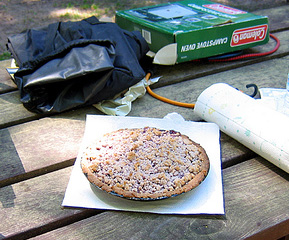
Freshly-made thimbleberry pie.
(*photo
credit)October 14, 2010
Do We Honor Migrant Farm Workers?
I can remember during the
Second World War that an unemployed worker asked Daddy for some day work. We
could hardly afford to hire anyone other than our sole tenant who earned a
modest living, house, and garden space. However, Daddy gave him a few days. We
were at the dinner table and the poor soul told how much he had paid for a
cucumber, and I figured out loud how many minutes it took him at his rate of
employment to pay for the humble vegetable. All were shocked at my public
arithmetic, but I was concerned about justice to workers. Fortunately, the
fellow got better employment the next week -- and we were all relieved.
However, the problem has persisted. How can one pay just wages when one can not
afford to pay them? That applied in the 1940s with Appalachian migrant laborers
whom we tried to help in our own way, and applies to SOME Hispanic migrants
today.
A more recent story in our
parish in this century also speaks about immigrants. Felix was a migrant, a
family man, a hard worker and a member of our parish. One Saturday he went to
the store to replenish supplies using a friend's truck with which he was
unfamiliar. On leaving the parking lot, he stopped at the exit sign and
extended the truck too far in the face of ongoing traffic. In backing up he
apparently tapped a car just behind him. Not even hearing this, he drove on to
the next store. The woman driver in the tapped car was irate that a person of
his nationality should "hit and run." She hailed the police and confronted
Felix. Felix was bewildered and the next thing he knew he was hauled into
court. I begged the woman to drop the charges against Felix but for a long
period she refused while making nasty remarks about immigrants. The case was
ultimately dismissed with Felix paying the very minor damage -- and losing
nearly a thousand dollars in lost wages.
America
has welcomed migrants because we are all strangers and guests at one or other
time. America has been an attractive land of opportunity -- and migrants cross
and sometimes die in the burning Arizona sands trying to get here. The toll
this year in the Arizona desert has been the highest recorded. Migrants are
preyed upon and lured to this country with little in support systems;
undocumented workers are at the mercy of employers, so that we can have our
cheap food and services. Unfortunately, our affordable food prices are thanks
to sweaty migrants -- uninsured, hidden, ill-housed, but deeply wanting a better
life for their loved ones. National and international policies are critically
needed both to control migration and to be fair and just to all parties
concerned. It takes fewer resources to furnish employment for migrants in their
land of origin than in the land of destination. Fair working conditions are a
global issue and need cooperative solutions.
An
answer: Immigrants are valuable resources and ought to be welcomed with all
due respect and given quality employment. Still better yet is to help provide
places of work in their lands of origin so they do not have to pull up stakes
and move.
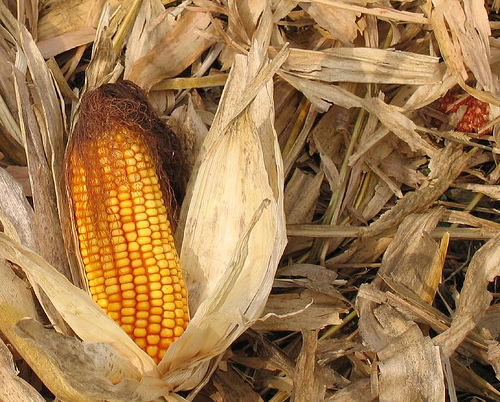
Corn cob, left behind at the end of a season.
(*photo
credit)
October 15, 2010
How Does Patriotism Enter the Food Picture?
The
Second World War came after hard Great Depression times and, were, for those
of us on this side of the Atlantic, an improvement in the farm picture -- though
it would have been unpatriotic to admit it. We developed a "Victory Garden"
mentality, that is, we grew our own food and some surplus to help in the war
effort. Gardening helped in the vast lend-lease operations required to keep the
United Kingdom and other unoccupied allies (including the Soviet Union) afloat.
Growing one's own food freed the overburdened transport system for weapons'
shipments.
I
have an advertisement on my wall from Life magazine during the war years
(to prove that women in the war painted their legs because nylon was all going
into parachutes); however, the adjacent ad shows canned beans prominently
displayed -- the display choices of an age when canned food brands were
prominent.
We
did not have much money during the war and thought it great to have a nickel to
go in and buy a Pepsi with ice. We could not buy sweets on a daily basis as did
others who were on the school bus with us. All change was meant for college
years ahead. We never heard the clink of coins until years later. Even school
lunches which cost a dime were too expensive. We took our own (large slabs of
country ham on homemade bread with Mama's dill pickles wrapped in wax paper
along with an apple). I was ashamed but pleasantly surprised whenever Glenn, a
classmate who ate the regular school fare, happen to come over to where we rural
kids ate. I would divide and share the huge sandwich, for I could not waste it.
Weekends
were times for treats. As mentioned, the war years meant some shortages but
they were not really that burdensome. We were even able to have some
store-bought bread and baloney for an occasional weekend meal as a treat. We
also would buy a twenty-pound block of ice and take it home after Mass. We put
the block in an old gunny sack and used an old dull axe to smash the block into
crushed ice, and then we proceeded to make ice cream using the fruit of the
season (strawberries, peaches, etc.). We took turns cranking the handle until
it got stiff, and that meant the frozen contents had to be partly dipped out;
churners got "first tastes."
The
war years meant rationed meat and sugar. In fact, since Mama canned many
preserves, she traded our meat stamps for sugar stamps from urban kinfolks who
were heavy meat-eaters. Incidentally in the First World War flour was
rationed. Citrus fruit and bananas were far more limited at times, for such
treats were Christmas fare alone; we ate local fruits in preserves made from the
homegrown apples, pears, peaches, plums, grapes and cherries. Occasionally we
saw movie shorts; we heard radio reports and looked at periodicals depicting the
hungry conditions of the Nazi-occupied territories -- all part of the war years.
An
answer: Patriotism sometimes involves rationing of food.

Passiflora incarnata, passion-flower.
(*photo
credit)
October 16, 2010
Food Day: Are We Growing in Awareness?
Today
and every day ought to be "food" day. Our food keeps us alive, and so each day
we ought to become more aware of what we eat. At some time in our early school
days we became aware that others had food problems; this was especially true
when we saw pictures of emaciated children, usually in China or India. Our
first impulse was to turn our heads from these horrible sights. However, as an
emerging spirituality was being planted in formative years, we looked back
again. Other people were not as blessed as we were; they suffered from lack of
food and yet they were our brothers and sisters. Even some of the school bus
riders looked so thin and pale, that is the white kids, for the segregated black
ones had to be picked up on a separate bus --making my blood boil. Differences
existed in what was on the meal table at a given time, and we were taught to say
prayers before and after meals in recognition of what God gives us. With time
our family resolved to integrate our dinner table -- truly a family decision.
Church literature and
"Lenten Rice Bowls" have an effect on churchgoers, especially the young. If we
give our pennies and other change, then someone will have enough in another part
of the world. A "catholic" outlook means that with respect to food we take on a
global concern -- and this started early in life. The sisters were good at
instilling a sense of social justice, some fundamentals that stuck with the
years. Interestingly enough, first on the long list of injustices was lack of
food for some.
Food
Day was really a 1970s creation of which our Center for Science in the Public
Interest (CSPI) was an instigator. A number of prominent people were called
together about the year 1973. I recall we met in a retreat center in Virginia
that was arranged through the director of the America the Beautiful Fund. The
meeting included Bishop Gumbleton, for he stayed at St. Peters where I resided
on Capital Hill. CSPI did the leg work for that first "Food Day" and it was a
highly Washington, DC-focused affair. In a few years this became a national and
then a global observance with far more funding and sponsors.
Awareness
of numerous food problems has gradually developed in more sophisticated ways
over time: food sources, irradiation, possibility of botulism, label
information, advertising, shortages, size of servings, fast food choices, cost
of foods, and on and on. If we study primitive peoples' food-gathering habits,
we find that the quantity of foods to tide one over in winter months became a
primary focal point. In 1672, Jacques Marquette wrote about the concern of the
entire tribe, especially when his Native American group moved rapidly to St.
Ignace at the Mackinaw Straits to avoid the Sioux and their lack of traditional
crops. For such people every day was a "food day."
An
answer: "Give us this day our daily bread" becomes all the more meaningful
as our world undergoes climate change with more severe droughts, floods, and
storms.

Barn on family farm. Woodford Co., KY.
(*photo
credit)
October 17, 2010 Homily:
Bread for the World Sunday
When the Son of Man
comes, will he find faith on earth?
(Luke 18: 1-8)
The parables of Luke are
rare jewels that shine in different ways and call us to reflect upon them in our
personal lives. Here is the conflict between a hard-hearted judge who does not
fear God or respect any human being and a persistent nagging widow who threatens
him. The battle is won by the bothersome lady because the judge wants her to go
on. And what about the third unpleasant character, the one damaging the widow
in some way?
A
number of years back, I recall a persistent widow who insisted congressmen stay
in a possibly late-running legislative hearing to know how her road had been
destroyed by a coal company. They stayed. Persistence pays off for such
people; a loving God is all the more willing to listen and be with us in times
of troubles. We too are to be persistent in how we approach the Lord in our
requests. This parable is partly new and yet is a continuation of the faith
discussions of the past three Sundays where incidents related to Lazarus
(closeness of the poor and our need for sensitivity), the faithful laboring
servant, the gratitude for gifts given by the healed Leper, and now this widow.
Amazingly, this sequence in Luke is a journey of faith, our road to faith looked
at from the side of responsiveness, fidelity, gratitude and now persistence.
All are characteristics which need to be emphasized and reflected upon during
our daily meditations.
Whether or not I truly know
what I need, do I still pray with confidence that my prayer will be answered?
We know that God always answers our prayers. Are we willing to continue to
pray, trusting that God is answering our petitions now or very soon? Shouldn't
we pray that we hear and understand the answers?
And do we have faith that God is
a ready and fair judge who acts in sufficient time for our hopes to be
realized? The Almighty is not overcome by other cares and concerns. We are
heard when we call.
In
order for our faith to grow well with sensitivity and gratitude, we need to pray
always. Perhaps this is the Sunday more than any other when we examine our
prayer life in greater detail with reference to food issues. Are we clear about
what we are praying for and give some time each day to God? As fellow wayfarers
are we sensitive to those who are discouraged? Do we have a friend to whom we
can talk about our journey of faith? Do we pray for others who hurt in some way
and especially those in need of adequate nutritious food? A journey does not
mean an easy ride; it can be arduous and can require effort and endurance. Do
we understand this and trust that God will give us the strength to carry on
through all kinds of difficulties? Do we have faith that world problems will be
solved to benefit all especially the poor?
Prayer
of the week: Lord, give ALL of us our daily bread.
Introduction to 1950s:
Food as Festive
There was a wedding in
Cana in Galilee. The mother of Jesus was there. (John 2:1)
Absence
makes the heart grow fonder. When we are flying from the nest for the first
time, that adage takes on special meaning. Homesickness comes to those who
regard their home as a safe haven and an enjoyable place and their family as
near and dear. Those breaking away look back to festive occasions with yearning
hearts; they also look ahead to returning for major occasions to a home base
and rejoice in the sights, sounds, smells, tastes and feels of good food as
captured in memory. Part of fondness is hard to put into words; it includes
the spice of love that has gone into preparing the festive event.
Mama's
home cooking was missed when I was away at college and beyond. I did not forget
the experience, for distance did not take away the memories of certain flavors
and tastes. Actually the period of breaking away from home was of learning new
festive events and happenings, those that substituted in some way for happy and
fulfilling family life as known in the past. A sacrifice in giving up is never
fully satisfied in what is taken on, though the new has its own definitions of
fulfillment and can be richly rewarding as well. When I gave up family for the
larger Jesuit family on September 1, 1956, all of this giving and receiving
started to make sense, though it would take time to fully adjust to new
community life as such.
Although
food was different, it was good and plentiful and tasty in its own right. A
great difference in those early pre-Vatican II years was that what we
experienced in religious community as to meals harked back to fifteen hundred
years of Christian monastic tradition. We sat according to ranks at long
tables; we ate at regular times by the bells; we were served or took our turn
serving in a prompt and efficient fashion; we listened to readings mostly in
English from the Scriptures and writings of the Society. When it was our turn
to read, we were terrified that a mispronunciation would be heard by the whole
assembled body, "Repetat Quaeso!" On occasion we knelt and said we were sorry
for disobeying rules (I took one a "culpa" for engineering the set-up of an
alcoholic still in the woods); and we were allowed to speak at times,
especially on festive occasions.
Eating
by the monastic rules was good discipline but not the calling of an activist or
of one working in the everyday world of give-and-take. With post Vatican II
changes these eating habits were modified. However, I found it interesting to
eat in our moments of silence at breakfasts, for here one observes a total
eating experience. We have time to see, taste, smell and even feel the food
texture. We start to make judgments about foods without thinking about it.
Attitudinal changes were occurring.

Harvesting of research plots, University of Kentucky farm.
(*photo
credit)
October 18, 2010
Is Eating Food a Total Experience?
We
look for any excuse to celebrate and eat. This occurs at formal banquets, club
lunches, church potluck, pig roasts, commercial buffets, social breakfasts, and
on and on. We gather and share our lives with others in a total atmosphere of
food -- and generally the associated sounds, sights, feelings, smells and tastes
all add to the ambiance. The food eating event becomes a total experience --
and, as we began to mature, this experience became more evident though we seldom
ever expressed it for fear of raising a discussion topic.
People
who are socially inclined like the experience of celebrating, and the meal is
the natural setting. When we get along with certain people, we find more of an
inclination to gather and enjoy each other. Liturgically, the Eucharist is the
ideal setting to celebrate the "work of the people." Gradually as I came to
understand religious services better, assembling to celebrate made much more
sense, for in gathering we come to see our needs for and with others. During
the 1950s, when I first entered the Jesuits, I saw the effort being made to make
feasts just that -- feasts to celebrate. Festivities have always included the
care in preparing the meals. In our Society of Jesus certain brothers have
devoted their lives to cooking and food preparation, to making all enjoy the
friendship of coming together, and have often stayed in the kitchen to direct
activities. These good folks have taken great pains in preparing appetizers,
main courses, and desserts.
No doubt, the use of food of
all types fills the food history and recipe books, and these have their special
value for those preparing the special events. I am not a "recipe" person.
Throughout 2009 I prepared a different soup each day; some were very simple and
some took time, care and creativity. The 2010 year with a different salad every
day is far easier to effect. However, when there are no guests to cook for, we
learn short cuts and hold to them, something that retards improving food
experience.
My
brother Charlie, the apple-grower, bites into one of his favorite "gold rush"
and explains that most fruits do not give the total experience of eating. He
would probably say that a banana is eaten silently, whereas there is a crunch
with a good firm juicy apple. Certainly fruits produce different experiences,
some of which capture the imagination better than others. Granted the sound of
a crunching apple, its subtle smell, the texture of the material in the mouth,
all of these have an effect that accompanies the customary sight and taste.
Rather than trying to contrast different fruits, it would be better to emphasize
their total unique experience.
An
answer: Our awareness of life demands that we enjoy all aspects of it; in
appreciation we thank God for the bounty, variety and experience of food. We
need not be gourmets nor ungrateful boorish eaters; with time we learn to savor
good food even when simple, and to share our experiences with others.
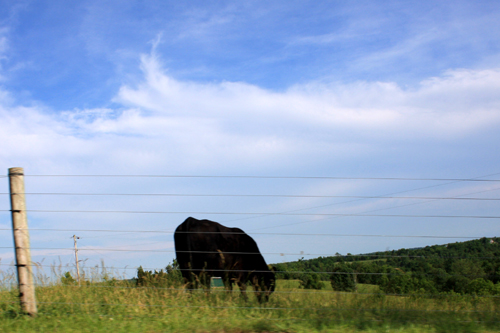
"Chewing on a cud by a contented cow..."
(*photo
credit)
October 19, 2010
Do Foods Make Sounds?
I
guess the answer is qualified: most foods do not speak but preparing them,
eating and digesting them, cleaning up after, and making comments about them are
all expressive in some fashion. The sounds of food materials include:
Creaking sound of corn
leaves opening on moist night
Humming of pollinators as
they move among blossoms
Thudding of pears or apples
falling to the ground
Clanging of the dinner bell
at rural farmsteads
Grumbling in one's stomach
on approaching a laden feast
Clinking on china for
silence and prayers
Praying a "gravy chilling"
oration
Sizzling of chicken in a
skillet of hot grease
Crunching of someone biting
into a juicy apple
Slurping on a dripping ice
cream cone
Chomping on potato chips
Chewing on a cud by a
contented cow
Sounding after eating beans
without complementary protein
Singing of a happy cook or
baker
Cracking of
peanuts-in-the-shell
Prying open clam shells and
shucking clams
Splattering of baby food
across the floor
Biting into buttered and
salted corn-on-the-cob
Clinking of a pan of hot
bread just out of the oven
Tinkling of milk from goat
or cow into an empty pail
Conversing while consuming
food
Guzzling down a drink after
running several laps
Sipping a cup of coffee or
tea
Crunching of a chocolate
chip cookie between teeth
Sighing after tasting one's
favorite dessert
Calling a breakfast order
in a fast food restaurant
Crackling of cereal nuggets
when the milk strikes
Tearing off the wrapper of
a candy bar
Excusing oneself to get to
the condiments
Talking with one's mouth
full
Explicating when the dish
is too hot -- or spilled
Slicing sound of the
carving knife in the roast
Ladling the spaghetti sauce
on the pasta
Splashing of the veggies in
the cooking kettle
Smashing of the crackers in
the soup
Sharing a pretzel between
friends
Dicing cheese on a cutting
board
Washing dishes after the
feast
Digging in by a hungry mob
at a loaded table
Shoving back the empty
plate and belching
Thanking and clapping for
the cook
Shoving the left overs in
the refrigerator
Popping popcorn or
cranberries coming to boil
Smacking of lips
---
Additions invited! --
An
answer: Foods don't; growers, preparers and consumers do.
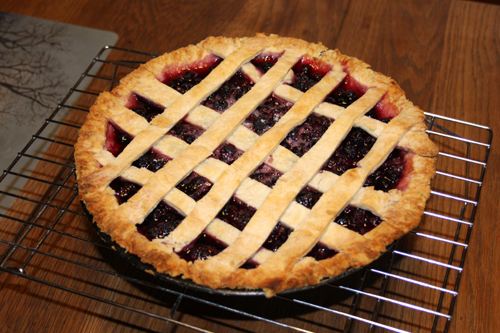
Fresh blackberry pie from home-grown Kentucky fruits.
(*photo
credit)
October 20, 2010
Should We Be Proud of Certain Food Preparations?
Starting
in the mid-1950s I spent the second quarter of my life outside of Kentucky.
During that period, while eating many good meals, I craved the regional and
cultural foods of youth: fried chicken, corn on the cob, green beans and pork,
and many various cobblers, preserves, cakes, and pies of former times. I
remember Mama sent a fruitcake at Christmas when I was in the novitiate. After
learning about our dry disciplinary conditions in boot training, Mama, according
to her habit, amply soaked the fruit cake with a fine grade of Bourbon. In
fact, she gave it a double soaking. Beaming with Kentucky pride, I opened the
scented package and then remarked to the many standing around, "The poor little
cake has fallen down while in the mail." I turned around while all were
laughing and proceeded to tell how Mama used Bourbon for candy, mincemeat pie,
ice cream (to a smaller degree lest it not freeze). and her hickory nut cake for
which she was famous. When, after lecturing, I turned back and was shocked to
find it had been completely consumed -- with a score of compliments to the
baker.
Cooking with a certain
cultural pride came in many ways because our home straddled the cooking
techniques of Alsace and Germany on the one hand and the cultural region of
Appalachia on the other. We had strands of both cultures in our home: the
fried chicken routine and hickory-smoked country ham specialties of the South
and the baking and sauerkraut/pork patterns of the "Old Country," as Daddy
called it. In fact, our European roots were kept planted in food that were the
pride of our womenfolk. Interestingly enough, although cornbread was a home
specialty, it did not have the preeminence bestowed on it by many Appalachians
along with "those" sorghum molasses, shuck beans, hominy, and sulfur-cured
apples for stack cake. These local regional delights were not part of our
family diet, although sauerkraut, turnip kraut, garlic sausage, "hog's head"
cheese and endive greens were.
The
domestic cultural gap was really bridged with fried chicken -- and Mama would
dress at least a hundred each year. She did the slaying expeditiously by
cutting the heads off with her trusty butcher knife as quick as a wink; she let
the headless beasts wander about during the other executions. Once a salesman
came, and Mama was in the process. He saw chickens running around with their
heads off and said in utter bewilderment, "What's going on here?" My youthful
answer was -- "Oh, it's a normal day on the farm." Then came our real farm
part, the defeathering operation after dipping the fowl in scalding water. This
would made one's hands wrinkle as osmosis took its toll on body moisture. The
reward in a few hours was fried chicken soaked in a deep skillet of
lard-turned-to-hot-grease -- and never any stomach ailments either. All said
and done, were the culturally-prized fried chicken and fried everything else
(potatoes, sausage, bacon, apples, etc.) good for us? If we worked hard, a
YES; if we dared to loaf, a NO.
An
answer: Savor culinary cultural prizes slowly, and only at special
occasions, for they can easily exceed moderation.

Caterpillar of swallowtail butterfly.
(*photo
credit)
October 21, 2010
What Are the Marks of a Good Cook?
There
are an analogous four marks of cooking, just as there are four marks of the
Church as mentioned at the end of the Nicene Creed. Here the "Culinary Creed"
may be amended, modified, changed, contested or neglected but I can attest that
I know good cooking by smell and taste and looks and feel -- and that means
there is a special cook who can be entitled to being called "good."
A
good cook is number one. A good cook goes beyond the recipe of another and
becomes quite creative in her or his own right. A certain self-confidence
pervades her or his kitchen, and this translates into the prepared specialty in
every way. The pride of the cook is in the taste, smell, look and texture -- as
well as the sounds of affirmation for the fortunate partakers of the repast.
A
good cook is wholly dedicated, not necessarily "holy" at this moment, but
moving in that direction. Preparing food can become messy at times, and a cuss
word may slip from the lips from the best of cooks. Though imperfect, they
strive for the perfection of knowing that their happiness is shared with those
who like their cooking.
A
good cook is universal -- part of a living community of cooks worldwide.
One is not just a good cook of a single dish, for even non-cooks can fry
hamburger or boil eggs. Only the good cooks have integrity, and they know they
are a sister- and brotherhood of true believers.
A
good cook gained from past ages. There is a tradition that can be traced
from parent or granny or beyond. Culture and cooking go hand-in-hand, and so
the good cook realizes that he or she is carrying on something precious, whether
how to make a good pie or a tasty main dish. The hope is that others will catch
the spirit and continue good cooking that is either traditional or modern.
--------------------
Excuses for not being a good cook:
I eat because I am hungry
and then go on to other things;
It is more convenient to
eat out or at another's table;
I like less cooking and
more servings of raw fruits, vegetables, nuts, berries and whole grain cereals
(at least I warm the rolled oats);
Fancy cooking can await
another day;
I want to stay humble and
remain a poor cook;
If you don't like the
heat, stay out of any kitchen;
I prefer to compliment
good cooks;
I'm too lazy to try, and
too cheap to buy ingredients;
I'm always changing the
recipe; and
I confuse the cinnamon
with the chili powder.
An
answer: Good culinary marks are evident; mine are not.
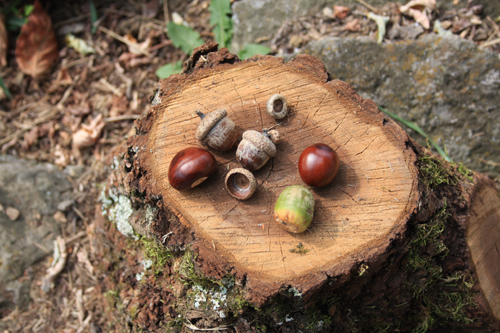
Feast meant for a squirrel.
(*photo
credit)
October 22, 2010
Should We Cultivate a Taste for Good Foods?
The
subject of food tastes can involve discriminating good tastes that are somewhat
objective and considering tastes that we personally like that are somewhat
subjective. Food tastes certainly straddle the objective and subjective -- and
I respect that fact. My niece, Annette, is a professional taste/flavor
scientist, and her calling deserves respect, but she would admit subjectivity is
also involved in tastes. I accept most food tastes because we were taught in
youth to accept all foods; being finicky is a mark of someone who is somewhat
boorish or has too much of good things. I like smelly cheese and buttermilk,
sweet and sour pickles, fried and baked chicken, clams and mussels. Other than
castor oil, I do not recall any taste I really disliked.
The taste of food grows on us
with age. At the start we take food not by choice of taste but because we are
hungry. We are less demanding of taste at first and so eat more when we desire
to have a full stomach. However with time and through learned experiences, we
are able to choose what tastes we like and even what we dislike. With time we
become more discerning about our tastes and these come especially when the peer
group expands, and we associate with others who regard this or that taste as
exquisite.
Some
smack their lips at certain foods and anticipate the coming glory of that first
bite. I always regarded this as a little overdone and really wondered whether
this was being suppressed in my memory -- foreign thoughts that ought to be
avoided. Actually like smells from the past, certain tastes can bring back
memories, and so part of the brain devoted to smell must be circuited in some
rather complex way. No, I refuse to repeat what others say, for no taste of
mine was ever dictated by such literary escapades. My brother Frank is regarded
(by me and others) as a connoisseur of Alsatian wines -- at least he
shyly enjoys the title. On the other hand, I am designated as a "kind of sewer"
with little discriminating to my name for most things, though I can tell the
difference between a mid-August and a late September tomato, and I know good
sauerkraut when tasting it.
A
Litany of Food Tastes might be a good exercise when stuck in traffic and
hungering for food: sweet, sour, bitter, insipid, rosy, luscious, nasty,
tempting, mouth-watering, etc. Everybody's taste is different, and so trying to
favor one or other is beyond the realm of the aesthetic. Some have rigid
routines in eating, and it makes us wonder how much variety of tastes enters
their lives. Didn't Gandhi stay with a simple diet of goat yogurt? Some do
not want to vary their foods or tastes -- and some do not regard variety as
important at all. However, a quality of life makes some variation in flavors
worthy of consideration. It makes certain days run-of-the-mill and some days
special and festive.
An
answer: Yes, but consider taste differences with a light-hearted sense of
humor. We should like certain tastes through personal judgment, and yet accept
an objectivity to good tastes.

Buckwheat and buttermilk homemade pancackes with ripened
berries.
(*photo
credit)
October 23, 2010
Do Good Food Scents Make a Quality Environment?
The
simple sense of smell is far more complex than at first imagined; it turns us on
or off without much rational thought involved. A good-food aroma makes our
mouth water and elicits the desire to partake of the anticipated repast. At the
same time, one must be aware that scents are powerful for triggering the brain
and recalling people to good or bad previous circumstances. To complicate the
matter further we know that some people have a weak sense of smell; we know
that some powerful odors (including room "deodorizers") are able to overpower
and mask others and drive some to an upset stomach; we know that some scents
linger and actually make unpleasant an appetizing dish about to be served (some
fish preparations). The sense of smell can do tricks on us, for we human beings
have very weak odor detectors in contrast to dogs and some other creatures who
can distinguish one of us individual people from another. Furthermore, our
senses of smell and taste work together.
Favorite
food smells may be pleasant in the mind and nose of the beholder and gourmet.
We must always remember scents are associations, involving the love and care of
the food preparer(s). In my mind's nose I can smell the pleasant fragrances of
--
Fermenting sauerkraut
Frying chicken
Steaming hot pancakes
Freshly roasted coffee
Bubbling cobbler right out
of the oven.
Hickory nut cake with a dash
of bourbon
Sizzling garlic-flavored
sausage
Cooled cucumbers with onions
in sour cream
But to be sure not all
smells are welcome; I don't like the odor coming from boiling water rinses of
poke shoots and leaves, even though the "poke salad" is delicious when garnished
with margarine, soy sauce, and a touch of hot sauce.
Some
odors are noxious to the broader range of people and thus are deemed pollutants
(e.g., hog farms and paper mills). Some odors are the warning that the
pollutant (e.g., hydrogen sulfide) can be highly toxic, and so odor-detection
becomes an avoidance mechanism. Once sorting through and relaxing in the
pleasant aromas and enjoying them are part of a higher quality of life and,
along with the other sensory experiences, help us come to authentic healing of
ourselves and our planet.
An
answer: We are reminded of good things through a scent that comes quite
unexpectedly. The catalog of these good things in our memory helps make for a
better quality environment -- and allows us to have a sense of the frontiers of
higher quality enjoyable life.
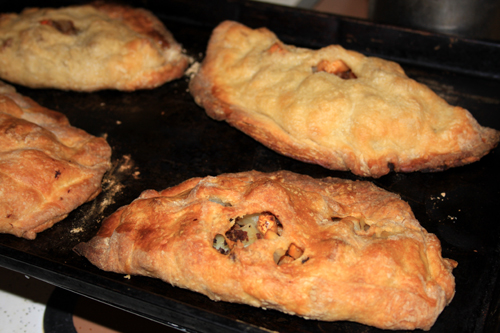
Pasties (rhymes with "nasties"), traditional lunch meal prepared by Cornish
immigrant
miners in the Upper Peninsula of Michigan.
Recipe here.
(*photo
credit)
October 24, 2010 Homily:
The Pharisee and the Tax Collector
The story (Luke 18: 9-14) of
the self-righteous Pharisee and the humble downcast tax collector is well
known. Each prayed in his own way, but the first, who thanked God he was so
good and above others, was puffed up and left unjustified. The tax collector
could only say, "O God be merciful to me a sinner." One was humbled and crushed
in his false exaltation; the other was exalted through his humble prayer seeking
forgiveness. One is reminded of Mary's Magnificat that the lowly would go to
high places and those in high places be brought low.
One would have expected
that the Pharisee who kept the law thoroughly and scrupulously would have known
how to pray well. He was even perhaps truthful in saying he was not greedy,
dishonest or adulterous, and he perhaps did not fib in saying he fasted twice a
week and payed tithes. All these he did, but he had a smug sense of superiority
over others and that became for him a crushing burden. No one really heard his
self-congratulations and yet they were present. On top of this, the audience of
Jesus would have not found a major flaw with this type of prayer.
In the time of the parables
such government agents often were not the best of the folks. They collected
taxes for the hated Roman oppressor of their own people, and were even
considered traitors. Hardly any group was more disliked, and so the bias of the
listeners was against one capable of shaking down and wringing the coin from the
common people. For all we know, this collector may have been engaged in many of
these faults at some time or other. He knew he had been imperfect and now was
sorry, and so he sought forgiveness. Yes, the audience would say, he deserved
to say what he did. The roles were reversed in the way of divine humor. The
tax collector went home justified, not the other.
God's grace is not something
earned, but God's favor is bestowed on those who pay attention, and that is what
grace is all about. We as individuals need to see the story and take heart in
our own actions, especially when we compare ourselves to someone else -- "there
but for the grace of God go I." We are not better than another person and
should never judge them or seek a higher competitive place over them. There by
the grace of God go I.
The story, like all
parables, has both an individual and a collective content. We, as citizens
should known party platforms and policies; we should listen to what candidates
say, for some sound more like the Pharisee's prayer than that of the tax
collector. We have got to do some proper discerning as conscientious citizens
and not judge self-motivations on the part of the candidates without more soul
searching. Who is the best qualified? Do I allow non-substantial biases to
color my voting choice? Do I extend my political influence to other voters?
Prayer
of the week: Lord, help us to be good citizens in what we personally do and
in the manner we seek to influence others.
Introduction to 1960s:
Food as Sacred
I am the
bread of life. (John 6:36)
My 1960s were taken up for
the most part with formal studies (philosophy at the start of the decade,
followed by three years of doctorate research in chemistry, then theological
studies for the L.S.T, degree, and then post-doctoral chemistry work and
research. The final required fourth year of theology was spent studying on my
own for the "Licentiate in Sacred Theology" orals, but also included chemical
research at Loyola University -- under Carl Moore, a professor who likewise had
Kentucky farm roots and was always proud of it. Our team work involved a joint
research project with the Great Lakes Naval Base science research section.
During that same period (being just ordained a priest) I was able to serve as an
associate chaplain at the same base during that height of the Vietnam War.
The ordination in June 1967
was the decade's high point for me. A course in Liturgical Theology added to
the focus on food for soul as well as body. Our Sacred Liturgy contains an
"Offertory" of bread and wine, the work of human hands; it includes a
"Consecration" in which believers hold that these elements are transformed into
the Body and Blood of Christ. Now the Calvary event transcends space and time
and we are witnesses to and participants in this event at Mass. The offered
gifts are transformed and then they are received in the "Communion" portion of
the Service. We become what we eat -- and if we eat spiritual food worthily, we
grow in spiritual grace and are able to serve God through loving service of our
needy neighbor.
The
1960s was the only decade that I did not help grow food crops, but it was the
time I sorely missed working in soil, and thus felt something lacking in the
connection of the physical and the spiritual as one sacramental act. Touching
soil that yields edible produce is a necessary human act, and the inability to
do so began to emerge in a more pronounced manner. The actual presiding at the
Mass includes a power that is frightening, because it takes a lifetime to learn
to enter into this fully and with proper meaning.
------------------------------
A
note ought to be made of food festivals. My interest in ethnic groups started
during the 1960s. In the course of time, I have participated in Italian, Greek,
Native American, French, German, Appalachian, Middle Eastern, Mexican and
Filipino festivities, all of which had a sense of celebrating culturally-based
foods. Quite often church festivals included the different sub-cultural groups
as well. Food as sacred and food as celebrating life in its full seem to come
together under cultural and church auspices. Food becomes the bridge between
the sacred and the profane and gives a universal appeal and meaning to God
becoming one with us.

Bright orange daylilies, an edible garden favorite year after year!
(*photo
credit)
October 25, 2010
Is the Eucharist Real Food?
Christians
are called to celebrate their gift of spiritual food, the Body of Christ. This
focal point of our faith is the key to our liturgical and spiritual life as
individuals and as a believing community. We recall the saving deeds of Christ,
remember the pledge of future glory, and become nourished with food to sustain
us in the troubled present moment.
"Do
this in remembrance of me." The Liturgy extends the passion, death and
resurrection of the Lord in space and time. The "Breaking of the Bread" (Acts
2:42; Luke 24:21) is a recall, a remembrance, a transcending event and presence
of what occurred two thousand years ago and is now in current space and time;
"there and then" becomes HERE and NOW. A Holy Land is now extended to an entire
Earth; Calvary is today. We are no longer mere spectators of an historic event;
we are participants in a cooperative endeavor as members of the Body of Christ.
Christ gives himself to the Father and then to all of us. From that historic
past through the apostolic succession involving the laying on of hands, the
ordained priest consecrates bread and wine into Christ's Body and Blood.
Cosmic Mystery of
future glory: Teilhard de Chardin had a vision of Christ's body in the
entire universe as he celebrated Mass at the altar of Earth. John Paul II
speaks of a Cosmic Act that unites Heaven and Earth "permeating all creation."
Something is coming to be for those with eyes of faith; the Kingdom comes and a
future promise is occurring in our present world. The mystery that is unfolding
before our eyes gives us the thrust to carry on, to believe in a meaningful
future and to act as catalysts to accelerate that future, to "look forward to
the day of God and speed its coming." (II Peter 3:12)
Nourishment
is needed to bond us within divine love, and thus the sacrifice in which we
participate is also a meal. The saving task before us as People of God is so
utterly important that we are unable to act without a food that is "Godself,"
nothing less. A mere symbolic food would simply be a recall of past events; a
future hopeful horizon is not enough to sustain us in the present. Nothing will
suffice except food, the bond of Charity, the Lord's Body. In this paschal
banquet we are empowered with the risen Lord, renewed with a promise of ultimate
glory, and energized by actual food that is Christ's person, a gift par
excellence, the Sacrament of Sacraments. "If you do not eat the flesh of the
Son of Man and drink his blood, you will not have life in you." (John 6:53)
Just as St. Athanasius reasoned that only a Christ, who is God, could redeem and
save, so as participants in the saving act of Christ, only those nourished by
divine food can so act. Our Christian life must be a meeting of sacrifice and
promise made present in Christ. We do not act alone, but join in a community of
faith, thanking God for engaging us in the work of the people.
An
answer: For believers, the Eucharist is real food, and our work is so
important that we must be fed on a regular basis.

Frost aster, Aster pilosus.
October 26, 2010
Worthy Communion when Neighbors Are Hungry?
This
is a very vexing question and deserving of deep reflection. It is not a new one
but rather it was first asked by several of the early Fathers of the Church and
their followers.
If one would look outside the
door and see the hungry gathered for some scraps and then go in with splendor
and forgetfulness and take part in a Eucharist, then one can understand why the
question is asked. But is the local scene the only place we find our neighbor?
The answer as to who is my neighbor may be more perplexing with an expansion of
locality to cover a single suffering planet.
We
all seek to take the Food from Heaven or Eucharist with a certain degree of
worthiness -- and we attempt to purify ourselves through confession when we
experience being totally unworthy. In fact, we all know that we are never fully
worthy and thus we say "Lord, I am not worthy" before receiving Communion. So a
general spirit prevails of our own need for God to make us more and more worthy
through divine mercy and generosity and our response.
A
sense of neighborhood is certainly growing when we experience through
Internet and television others who are needy, scattered throughout the planet.
Our age is ever more mindful that our neighbors are many doors away but still
accessible through the technological innovations. They are present to us in
ways that previous generations living long distances away never visualized.
Through modern communications these distant people come to our door begging for
supplies and we know they are out there.
Hunger
is a fact of modern life involving a planet with over one billion hungry people.
These may not be an immediate concern of our locality but they are our concern
nevertheless. This terror of hunger is in the demeanor of parents with bare
cupboards to meet tomorrow's bread needs. The great tragedy is that it occurs
in this age of immense possibilities to produce food supplies, to store them
properly, and to transport them to places of need. This is a scandal that is
growing on us in a world of concentration of wealth and growing destitution.
Can democratic people stand by in silence? Must we speak up and defend the
rights of human beings to bare essentials over some sort of right to property of
any size?
An
answer: A paradox emerges for with the closeness of world neighborhoods
through more rapid transportation and communication, we become more aware of our
neighbor, and through current information, more aware of their need. As that
awareness of need increases, we accept the responsibility of being democratic
people; we can effect changes that will redistribute resources to others. An
awareness of our responsibility grows also as does our unworthiness in
responding to the tasks at hand.
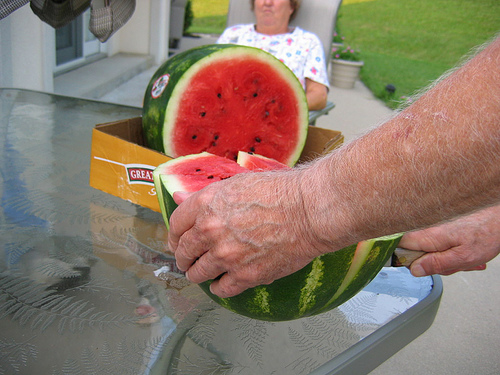
Family celebration of togetherness.
(*photo
credit)
October 27, 2010
Why Celebrate When the World Is in Such a Mess?
On the most elementary
level, we celebrate the gifts we receive and the givers of the gifts. We always
gain insight when we see grateful people, especially those who are elderly or
are being forced to be committed to a senior citizens home, or to give up the
driving license, or to accept hospice at this stage in life's journey. In one
sense the occasion may be filled with shocking reality of immobility or
impending illness and death; in another way, it is the reality of knowing that
all gifts are from God and all gifts are passing. We celebrate each birthday --
even those that mean we may be approaching the end of mortal life. We celebrate
weddings even though we suspect that there will be bad times as well as good
ones. We celebrate graduations even when the graduate does not have a clear
understanding of what is in store.
Gifts
achieved are what ought to be celebrated in any sacred liturgy or secular
event. It is easy to celebrate the past, but it becomes far harder to celebrate
an anticipated future event before it happens. What we all have to see is that
the food associated with the celebration is itself a gift already acquired.
Certainly the celebration of food gifts is part of "liturgy" or the work of
human hands. The celebration is a memorial of what has been achieved, not what
will come in the immediate future. However, part of celebration is that we
energize and make ourselves more ready for what is to come. Nonetheless we
celebrate and rightly so, for life achievements are gifts worthy of celebration.
Yes,
the world is in a mess, but we do not suspend the celebratory mood just because
some things do not go right. In fact, a celebration at the time of a mess (as
the 2010 Haiti earthquake victims gathering to sing and celebrate together) is
the perfect time to understand how much the gift of survival and life means to
all. Coming together for mutual growth and encouragement is really a time to
consider that our enduring faith even in hard and messy times is itself a gift
worth celebrating. We hope that this spirit continues and thus we celebrate
that it is gift given to this moment and in the solid hope to God that it will
continue.
Banquets of all sorts are
cherished. Thus we need a special event once a week in which people can
celebrate with song, prayer, flowers, and uplifting talks and homilies. Yes,
formal occasions are needed to help punctuate lives, and our giving ourselves to
them means that we can share in others' good times. In other words, gatherings
of all sorts, sacred or secular, picnics or banquets, lunches or dinners, coffee
breaks or pauses, all can have a celebratory mood that encourages us to continue
on the way.
An
answer: We do not have to celebrate the mess in which we find the world;
we celebrate that God has called us at this particular time in history to help
in the cleanup operation. However, doing this takes nourishment; and food and
celebration mesh together to help us engage energetically in the task ahead.
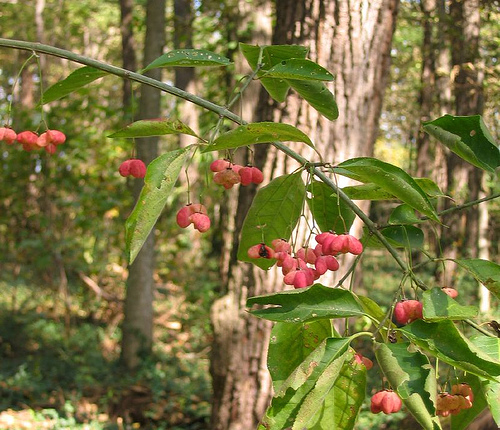
Eastern wahoo, Euonymus atropurpureus.
(*photo
credit)
October 28, 2010
Why Ought We to Fast for Self AND Others?
How
can the guests at a wedding fast as long as the groom is still among them?
(Mark 2: 18-22)
There are times to fast and
times to celebrate. The first is more often overlooked, and yet fasting is part
of most physical and religious disciplines. Fasting is regarded by some as an
opportunity to give the stomach a rest, for we hear that fasting is good for
physical health as well as the spirit. Each year as we approach Thanksgiving
Day, Oxfam encourages people to observe a fast for the world's poor, and to send
the money saved to one or other world hunger projects. This
consciousness-raising practice allows one to become aware of the amount and
richness of the food consumed, how much our food differs from that of people in
other ages and lands, and how little food more than a billion people of the
world live on at this time. Fasting then takes on a different direction; we do
it for more than ourselves and have it resemble practices for causes such as
walk-a-thons and concerts.
Fasting
is promoted for spiritual as well as for physical health. To refrain from
eating is to say that good things can be taken in overabundance and thus can be
harmful. Fasting is a way of accepting the human condition and realizing that
we are tempted to overindulge -- and we are free to refrain from good things
for the betterment of all including the control of our weight and our
appetites. Fasting can be difficult. We know when we fast and have some hunger
pangs, and for some of us this can be a trying period. What is it all worth?
The answer generally comes after the fasting period. Fasting becomes a coupling
of the personal with the social dimension as we reflect on whether to initiate
or to continue the fasting. Personal discipline and individual perfection
become an ever higher priority.
A
secondary social effect is hardly brought up, because people expect during
fasting periods to do this without telling others. Maybe at times we could be
inspired to talk about abstaining from meat or sweets or why we are drawn to
fast. We live in a nation where many have never had to choose to say "no;" like
spoiled children we only need to stamp our feet. Upon deeper reflection we see
meaning in fasting for others; such a social exercise becomes an act of love of
God and neighbor. We ought to fast as a community knowing that God's bounty is
given to all. We can't hide our testimony under the basket, but ought to think
about enlightening others. Fasting is ultimately for the benefit of the human
community. So often fasting, whether for individual or social purposes, goes
counter to the prevailing culture of spend, consume, and grab for more. So
speak up and fight the consumption craze by restraining oneself and be willing
to defend the act.
An
answer: Yes, it is good to fast and doubly good to gently urge others to
join in. We do not announce our fast by a trumpet, but it may have to be
defended when others scoff at the practice, for fasting is a theme worth
addressing in a consumer culture.

Shades of autumn.
(*photo
credit)
October 29, 2010
What about Partaking in Seders?
During
my formal training period in the aftermath of Vatican II, ours was perhaps the
first Catholic theological group in the Chicago area to engage in broader
ecumenical activities. This was a stepping out of our own religious community
and attempting to understand those of other faith traditions. The coming
together with these folks was educational and always heartwarming on the part of
all parties. Actually I did celebrate in later years a meaningful Seder with a
Jewish person (along with other public interest volunteers) when he could not
get away for a Passover event. This had special meaning, but so do church "seder"
ceremonies that are occasionally celebrated around Holy Week. These events
attempt to be faithful to the Jewish rituals except no Hebrew is used; however
they do include the prayers, wine servings, bitter herbs, lamb and matzo. Also,
such times are opportunities to discover the emerging significance that Yhwh
commanded: that this was to be a "perpetual" celebration.
It
became evident at my first experience of Seder and in every subsequent one that
our Catholic Mass and Orthodox Liturgy are the continuation of that first
Passover event, and that we are part of the perpetual remembrance as Jesus
commands us. Jewish people may not fully agree with that assessment, but we
still ought to affirm our proximity and kinship to their ancient tradition.
God has delivered us from enslavement of all types; we are now in exodus or a
journey of faith to deeper involvement in the creative event; we are in need of
symbolic reminders of that sacred history. If and when we find togetherness in
such celebrations, it is because we share the exclusive focus on God as
absolute deity; we likewise share inclusive brother/sisterhood of all
God's people.
I
am not regarded as highly liturgical, and thus do not subscribe to any
individualistic embellishment of the Sacred Liturgy -- just the basic
celebration. However, the Seder has immense significance and is worthy of our
attention. Through the use of food and drink, this festival gives us a sense of
our need to thank God for deliverance, our fellowship with others on their
journey of faith, our need to grow in understanding with fellow human beings,
and a love of carrying on traditions as part of a living memory.
In celebrating our own
Seders we want to engage in an interfaith gesture. Just as we do not invite the
ones who are out of communion with our faith tradition to partake in our
communion, we should not impose ourselves on the sacred Jewish ritual (except in
the necessary case mentioned above). This is their Passover celebration just as
our Holy Week is ours. Let us also pray that our Christian rituals become all
the more meaningful for us, especially in keeping our traditions within that
holy season.
An
answer: At Passover time we affirm our Judeo-Christian heritage and we
unite all the more closely with the believers in the Book -- and others as well.

Fallen leaves of the sugar maple, Acer saccharum.
(*photo
credit)
October 30, 2010
What Are Ways to Reduce or Avoid Food Wastes?
Food
supply experts tell us that, if American and European nations were to cut out
their food wastes, there would be sufficient food left to feed the one billion
people who go to bed hungry each night. What a proposal! When food is wasted
it has left the food commons, reduced the available supply, driven up food
prices and spread an insensitivity that affects the global commons. Here are
some faith-based, food waste-avoiding suggestions:
1.
Don't buy more than you need and keep it stored in a way that keeps it from
spoiling.
2. Preserve food that is
grown or purchased in large quantities or give the excess to food banks.
3.
Fix food so it can be reused (cooked vegetables put into tomorrow's soup) and
vary spices and herbs to acquire new flavors for the recycled dishes.
4.
Prepare food in smaller portions so that people do not overeat. Isn't food
wasted when it expands our waistlines? How often when we go to a restaurant and
the food comes out, do we find the portions to be enormous, and too much for us
to eat.
5.
Use snack foods that do not spoil easily.
6. While perishables cost
less in larger quantities, the fact that some is wasted actually makes smaller,
higher-priced portions more economical in the long run. A quart of milk will
not usually spoil before use; a gallon just might.
7.
If uncertain as to whether some food will be liked in the household, consider a
small sample introduction and see how it is received. Consider food dishes that
can keep for longer periods.
8.
School food services could actually reduce waste by keeping portions smaller and
encouraging students to return if desiring more. When generous amounts are
placed on plates and students think they are getting what they paid for, they
will accept large portions; some studies show that 40% of the food is wasted.
9.
Enhance the practice of larger meals earlier in the day and smaller ones later
in the evening; people live longer when eating like a king at breakfast, prince
at lunch and pauper at evening.
10.
Left over and outdated food in restaurants and food markets can be recycled to
those in need with a little care and some regulatory changes at city, county and
state levels.
An
answer: Yes, these are ways to avoid wastes and this listing is not
exhaustive. Our attention should be directed to proper food distribution, not
to throwing precious food away.
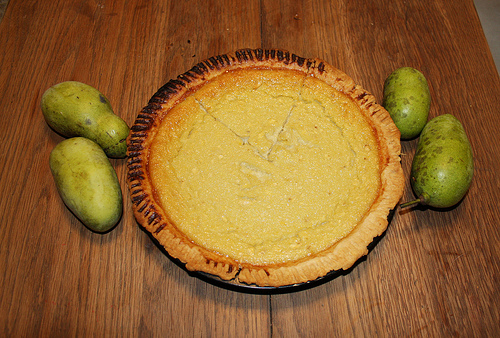
Fresh pawpaw pie.
(*photo
credit)
October 31, 2010
Homily: Invite Zacchaeus to Join
Today Salvation has come
to this house. (Luke 19:9)
Jesus brings salvation to
our wounded world, and we are to be as overjoyed, as the little man Zacchaeus
was over the coming of the Lord to us. This beautiful story follows the rich
journey of faith that we walk with many different characters we encounter each
week in Luke's gospel narratives. Some of these people we like and some we
don't, but who could dislike Zacchaeus? In fact, the core of the story is that
a hostility is rising in the crowd because tax collectors are regarded as
traitors for working with the Roman oppressors. How can Jesus who knows so much
go to Zacchaeus' house -- of all people?
Zacchaeus is disliked by
the social biases of the crowd. He may be honest and law-abiding but disliked
and, worse, unnoticed most of the time. Maybe he is even somewhat embarrassed
at first that anyone even noticed him up in that dense foliage of a sycamore
tree. Jesus does notice, and invites himself to Zacchaeus' house. The
unexpected event causes Zacchaeus to fumble and try to justify himself in front
of a frowning and eyebrow-arching crowd. They seem to be saying, "How dare this
man think he is so good!" Zacchaeus hastens to counter this opposition, but he
finds that Jesus is true to his word. Jesus is to pay dearly for this
relationship, for this reenforces the plotters who wish to halt his ministry.
Bring salvation to others.
Our world is filled with people supporting this person and disdaining another.
We live in a world of over-segregated communities. We fail to see that heaven
is a place where all types will some day celebrate together. We have to bring
the saving powers of the Lord to them here and now. "Catholic" means universal,
and that means we are challenged and concerned about all, even those we do not
always regard as united with us. We so often overlook the "little people," the
ones who are easily ignored and forgotten. That situation applies to
individuals within our communities, those who are the poor and the marginalized
in this and all countries. Seeing them and recognizing who they are is a
mission and a Christian mandate.
Coming to know others means
we discover some and even many who have joy to share and express when others
invite them. Give them a particular invitation. We lose the suspicion that
separates us; instead, we are called to help make their place safe and secure
enough to be inviting. By conquering disease, eradicating mosquitoes, providing
potable water, furnishing a steady food supply, and giving new affordable
housing, we open ourselves to coming to their homes -- our collective homes. We
extend home to the entire planet, a place where all can live in harmony with
each other. Then truly salvation will come to "this" house.
Prayer
of the week: Help us, Good Spirit, to discover those folks hidden in the
crannies of our communities, and to encourage them to fulfill their potential.
|